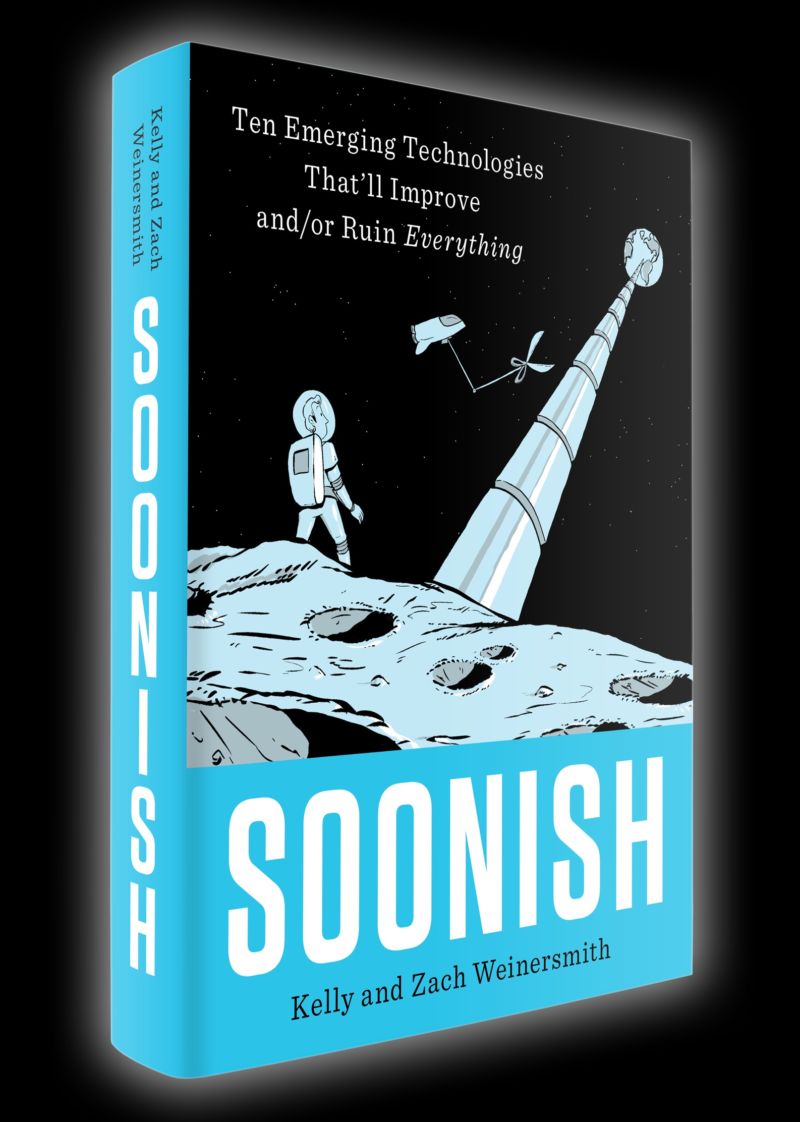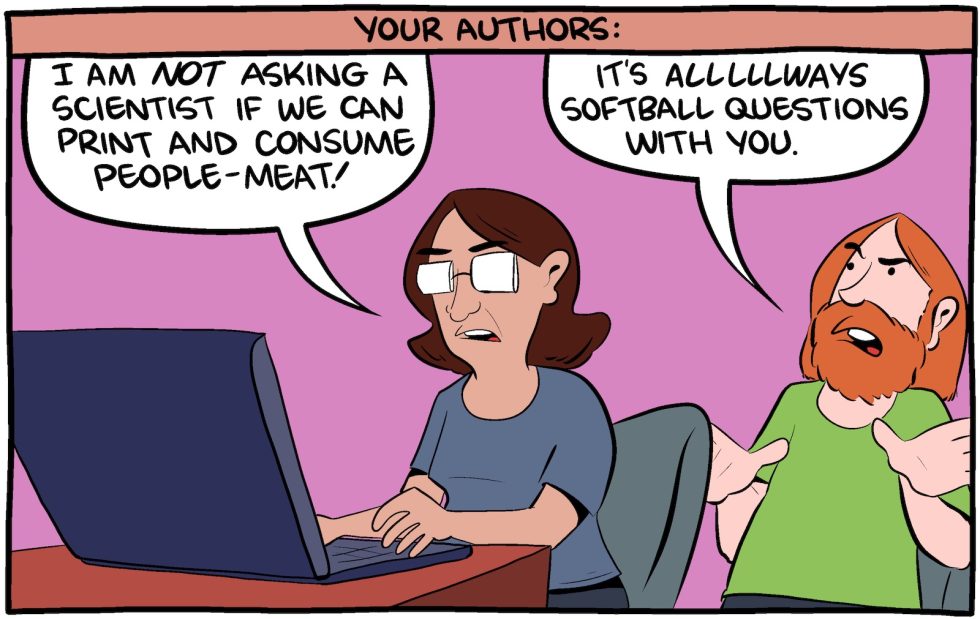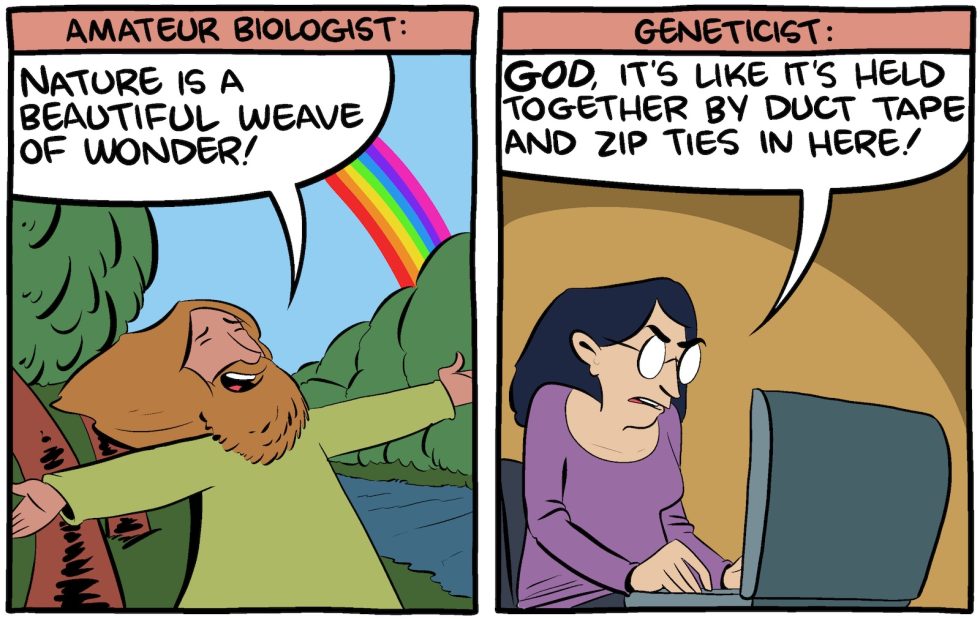
I only read three comics regularly, and one of those is Saturday Morning Breakfast Cereal (SMBC). It is clever and funny—even educational on occasion. I think it is safe to call me a fan. So, I was excited to hear that SMBC creator Zach Weinersmith had decided to cowrite a book with his wife Kelly, a bioscience professor at Rice University in Houston. Even better, their book would be about science.
Soonish is a not a single story; instead, it is 10 short stories. Pulling out the crystal ball, the Weinersmiths have chosen 10 areas that many hope will become actual, factual things that exist outside of our head or the lab. Each chapter is split into four parts: the first part tells us what the thing—a brain/computer interface, for instance—is, how it might be put together, and why we don't already have one. The second part asks the eternal question: what could possibly go wrong? And the third prognosticates on how the world will be changed by the thing. The last part is a funny anecdote about some of the Weinersmiths' encounters while researching the chapter.
Now, you may or may not agree with the Weinersmiths' choices. Space elevators, for instance, is not something I'd pick as ever being a thing—but their research is what brings their choices to life. They've spent a great deal of time buried under papers and talking to scientists. You can sort of feel the weight of the research pressing down on you as you read it. And not in a bad way—more like an extra blanket on a cold night.

Each chapter is also a fairly short read, coming across as more of a summary than a deep delve. This, I think, will put some readers off. If you already know a bit about robotics, space flight, or genetic technologies, then the brevity of those chapters may offer nothing new. But it is unlikely that any reader will not learn anything from the entire book—I certainly got a lot out of the latter parts. And if you just have a cursory knowledge of or interest in the topic, you'll likely learn plenty from each chapter. If you're looking for a popular science book that burrows down and exposes more of the subject, however, or a book that brings the scientists behind the work to life, Soonish is not a book for you.
For the most part, Soonish doesn't really challenge the reader, either. Yes, there are ethical challenges arising from some of the science the authors look at. And the latter part of the book is crowded with such subjects, like organ donation and genetically modified humans. The Weinersmiths do go through the ethical challenges, but I never felt uncomfortable. Soonish feels as if the authors shied away from getting into the really nasty choices that we might have to make as a society or what the consequences of a bad decision might look like. It could also be that the humor scattered through the book lifted the weight.
Cartoons are scattered through Soonish. No spoilers, but they are funny in the same way SMBC is funny. Humor is a personal thing, though; if you don't like SMBC, you probably won't think the humor in Soonish is that great. To my surprise—I was really looking forward to the combination of cartoons and more serious writing—I found the cartoons distracting. You turn the page mid-paragraph—and there's a cartoon. You want to read the cartoon, but if you do that, you may lose the thread of the paragraph. And now the internal struggle has destroyed whatever understanding you had of the paragraph, so you might as well jump to the cartoon. In the end, I started jumping to the cartoon on each page and then returned to the start of whatever paragraph I was on. I like cartoons. These are good cartoons. But books are supposed to be immersive experiences, and the cartoons pulled me out of the book.

The Weinersmiths are also very funny in the main text as well. Their writing is filled with little jokes that keep you smiling, as well as delightful anecdotes of their experiences researching the book. But, sometimes—maybe once or twice per chapter—a joke would break the flow of the text. I don't mean that a joke is so funny that you end up giggling hysterically on a train while people stare at you. (You need Mary Roach for that.) I just mean that the joke sometimes felt... tacked on. It's as if the authors had some agreement to achieve a certain density of jokes, and then a humorless publicist complained that they hadn't met the agreed humor density, so more jokes were added.
I like Soonish as a quick view of a few big ideas, and one of my non-PhD-holding colleagues who read the book learned something from each of the chapters. I think Soonish accurately reflects the state of the research that it touches on. That is a big plus. Many readers will enjoy the humor and the cartoons (it is not the Weinersmiths' fault that I can't hold on to a thought for more than five seconds). But Soonish offers a quick overview of the topics it explores, so if you are looking for depth, you would be better served reading a book on each topic. But you probably won't laugh nearly as much.
Soonish will be released on October 17, 2017.
Listing image by Saturday Morning Breakfast Cereal
reader comments
49